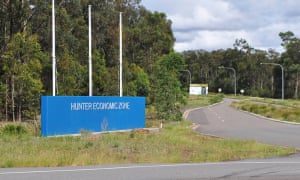Extract from The Guardian
HK and China-based firms behind plan have access to only some of required capital
The Hong Kong and China-based companies behind a plan to build new
coal-fired power plants in the Hunter region have access to only a
fraction of the required capital, an analysis of their finances shows.
Guardian Australia revealed the plan to build two 1,000MW coal-power plants in the failed Hunter economic zone near Kurri Kurri.
Hong Kong-based company Kaisun Holdings has said it will need to “look for potential investors” for the project, which energy market analysts estimate would cost between $4bn and $5bn to build.
Kaisun has a market capitalisation of A$33m. Its project partner, a China Energy Engineering Corporation subsidiary, lists its authorised capital as A$150m. The Australian joint-venture partner, Cavcorp, owns the HEZ land but is worth $25,000 on paper.
Environmental and anti-coal groups are already calling on potential
investors to stay away from the project and for federal and state
governments to rule out support.Guardian Australia revealed the plan to build two 1,000MW coal-power plants in the failed Hunter economic zone near Kurri Kurri.
Hong Kong-based company Kaisun Holdings has said it will need to “look for potential investors” for the project, which energy market analysts estimate would cost between $4bn and $5bn to build.
Kaisun has a market capitalisation of A$33m. Its project partner, a China Energy Engineering Corporation subsidiary, lists its authorised capital as A$150m. The Australian joint-venture partner, Cavcorp, owns the HEZ land but is worth $25,000 on paper.
“We have a very long process of assessments for any person who wants to come up with projects,” Berejiklian told reporters in Sydney.
Asked whether the government will approve any new coal-fired stations in NSW, the premier said: “That’s not on our agenda at the moment.
“We are the most resilient state when it comes to our own energy needs.”
The NSW Labor leader, Michael Daley, said more detail on the proposal was needed, but he would be “very, very surprised” if any private company wanted to invest further in coal-fired power.
“The way of the future for baseload power in NSW is clean, green, renewable energy with battery technology,” he said.
“We’ll wait and see what comes.”
The federal energy minister, Angus Taylor, recently sought applications for energy generation projects that could be underwritten by the government. Taylor has a list of 66 potential projects – including 10 coal-fired generation projects – though it is unclear if the HEZ proposal is among those under consideration.
Taylor has said he was aware of reports of the memorandum of understanding, but that the government was “not involved”.
However, the federal Liberal backbencher Craig Kelly said the plan was “exactly” what the Australian energy market needs.
“If the government needs to underwrite it, if it needs a little bit of help, then that’s what we should be doing,” he told the ABC.
The sole director and shareholder of Cavcorp, Frank Cavasinni, has not responded to several requests for comment. The Parramatta-based businessman purchased land in the Hunter economic zone several years ago, but has been so far unable to progress any development plans at the site.
Kaisun, which is based in Hong Kong but incorporated in the Cayman Islands, appears to mainly work as a facilitator for “belt and road” projects, helping investors move money in and out of China through Hong Kong. It is listed on the Hong Kong Growth Enterprise Market, a second tier of the main stock exchange.
Kaisun’s chairman and largest shareholder, Nap Kee “Joseph” Chan, is also a director and co-founder of Oriental Patron Financial Group, a minor investment bank based in Hong Kong. Chan also fronts an organisation that aggressively promotes the China “belt and road” policy, the Silk Road Economic Development Research Centre.
The third party to the joint venture, the China Energy Engineering Company’s Northwest Power Construction subsidiary, appears to lend the announcement the legitimacy of being backed by a state-owned enterprise.
Melissa Brown, a Hong Kong-based energy finance consultant with the Institute for Energy Economics and Financial Analysis, said the involvement of a state-owned company did not necessarily mean the deal had institutional backing in China.

No comments:
Post a Comment